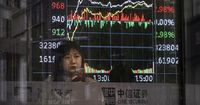In a dramatic escalation of trade tensions, President Donald Trump has raised tariffs on Chinese imports to a staggering 125%, while China retaliated by boosting its duties on American goods to 84%. This tit-for-tat exchange marks a significant moment in the ongoing trade war between the world’s two largest economies, raising concerns about its potential impact on global markets and consumer prices.
The new tariffs, announced on April 9, 2025, have sent shockwaves through financial markets, with analysts predicting a downturn in equities as uncertainty looms over international trade. The tariffs are part of Trump’s broader strategy to renegotiate trade agreements, which he believes have historically disadvantaged the United States.
According to the U.S. Commerce Department, last year, the United States exported a record $199 billion in goods to China, while imports from China reached $463 billion. This trade imbalance has been at the heart of Trump's tariff strategy, which aims to protect American manufacturing and jobs. However, experts warn that the tariffs could lead to higher prices for consumers and disrupt supply chains.
“This is, without a doubt, the biggest trade policy shock, I think, in history,” said Zanny Minton Beddoes, editor-in-chief of The Economist. She noted that while previous administrations have imposed tariffs on specific goods, Trump's sweeping measures are unprecedented in scale and speed. “We’ve crossed some kind of a Rubicon in the last week or so, and we’re not going to go back to the world as it was before,” she added.
In response to the tariffs, various brands have begun to adjust their pricing strategies. Restoration Hardware, for example, has already raised prices on its Cloud Sofa from $4,260 to $4,930 since March of last year. Similarly, Zwilling, a kitchenware company, announced it would increase prices effective June 1, 2025, citing unavoidable cost increases.
On the other hand, some companies are attempting to absorb the costs. Swedish brand Hem stated it does not foresee immediate price changes due to its warehouse in Chicago. International spice company Burlap & Barrel has committed to maintaining its prices, capping core spices at $10.
In the electronics sector, Nintendo has delayed preorders for the highly anticipated Nintendo Switch 2, initially scheduled for April 9, to assess the potential impact of the tariffs. The launch date remains unchanged for now, set for June 5.
As the trade war intensifies, the repercussions are likely to extend beyond immediate price increases. The European Chamber of Commerce in China warned that Trump’s tariffs could significantly impact European companies exporting from China to the U.S., forcing them to rethink their business models and supply chains. “This will lead to a substantial increase in operational costs and inefficiencies, and ultimately higher prices for consumers,” the chamber stated.
China’s response has been firm, with the Ministry of Commerce declaring that the country has the “firm will and abundant means to take necessary countermeasures and fight to the end.” This sentiment was echoed by former U.S. trade official Wendy Cutler, who noted that the path to restarting U.S.-China trade talks would be fraught with challenges.
“This won’t be an easy path to navigate with both countries doubling down and bilateral engagement at a virtual standstill,” Cutler said.
Trump’s administration has framed the tariffs as a means to re-industrialize America, aiming to bring manufacturing jobs back to the U.S. However, critics argue that such measures could ultimately harm American consumers by raising prices and limiting choices. “Nobody gains from a tariff war,” said Minton Beddoes, emphasizing that the costs of tariffs are ultimately borne by consumers.
The President’s aggressive approach to trade has also led to rising tensions with other countries. Trump has implemented a minimum 10% tax on nearly all imports, affecting a wide range of goods. This sweeping policy shift has led to fears of a broader economic downturn, as companies adjust their pricing and consumers face rising costs.
As U.S. consumers brace for the potential fallout from these tariffs, many are already feeling the effects. Brands like Saatva, known for their mattresses, have started promotions urging customers to purchase before price increases take effect. “Don’t wait: Beat tariff increases,” reads a banner on their website, signaling that the impact of the tariffs is already being felt in retail.
Amidst this turmoil, some brands are trying to maintain stability. Dieux Skin's co-founder Charlotte Palermino has stated that their products will not increase in price for now, as they assess the situation and explore ways to minimize costs. Meanwhile, sexual wellness brand Dame has introduced a $5 “Trump tariff surcharge” to help cover the costs associated with the tariffs.
Ultimately, the ongoing trade war and the newly imposed tariffs represent a significant shift in U.S. trade policy, with far-reaching implications for consumers, businesses, and the global economy. As both the U.S. and China dig in their heels, the road ahead remains uncertain, leaving many to wonder how this economic battle will unfold.
The stakes are high, and as analysts continue to monitor the situation, one thing is clear: the impact of these tariffs will be felt far beyond the borders of the United States.







